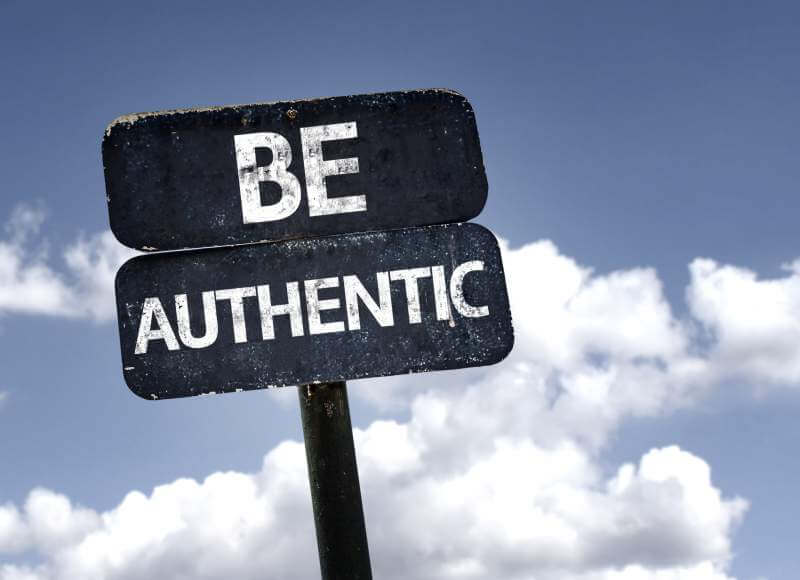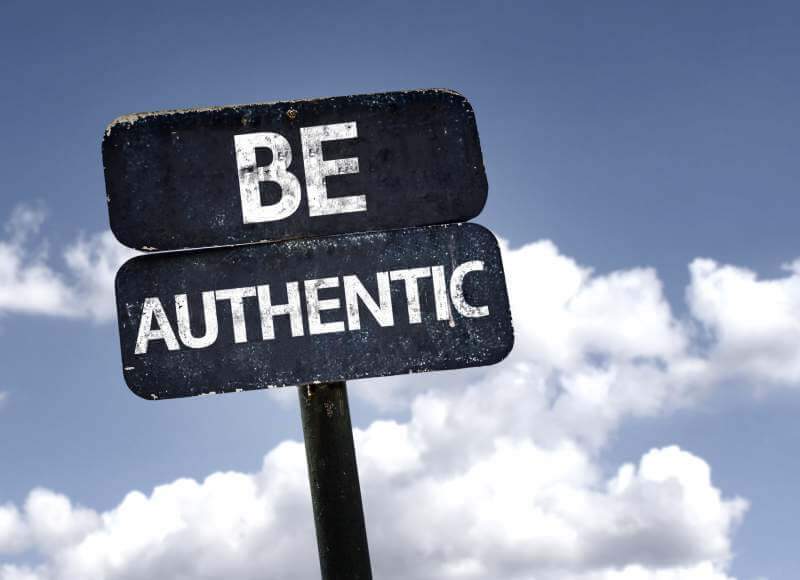
In the following guest post, Lukas Van Vyve of The Polyglot Life discusses the importance of being authentic in your language learning.
Do you dream of effortless conversations with locals during your travels and being able to say everything you want?
Or maybe of speaking without making a single mistake?
Perhaps what you want is perfect fluency?
You’re not alone; many people have that in mind when they first start learning a language.
However, like most of them, you might have discovered that reaching this kind of native-like fluency is harder than it first seems.
The grammar is complicated.
You keep making mistakes while speaking.
Conversations are difficult; you don't always understand the other person, he doesn’t understand you.
What you’re saying doesn’t resonate with him.
You don’t connect.
Frustrating, isn’t it?
However, it doesn't have to be that way…
What if I told you that a simple mindset change could relieve you from these frustrations and make you progress faster than ever?
It will allow you to focus on the right things when learning a language, which will boost your progress.
It will empower you to start learning a language, speak to natives and have them open up to you – even after just a couple of weeks.
Most of all, it will give you the satisfaction and motivation you need to keep on studying.
This mindset change might be the missing link that’s holding you back from connecting with the language you’re learning.
I discovered it myself through learning five languages and living abroad for several years, and implementing it has completely transformed the way I learn languages.
The keyword? Authenticity.
Ready to find out more? Read on!
By the way, if you want to be a successful language learner, while authenticity is important, using the right method is also key.
My courses teach you through StoryLearning®, a fun and effective method that gets you fluent thanks to stories, not rules. Find out more and claim your free 7-day trial of the course of your choice.
Why Fluency Is a Misguided Goal
I hear people say that they want to become ‘fluent’ in a language all the time.
But what is fluency, really?
Is it being able to say everything you want, without any mistakes?
Passing a C2 level test (according to the CEFR framework)?
Knowing the grammar and spelling of your language inside-out?
This is one of the problems with having ‘native-like fluency' as an ultimate goal: there's no definition everyone agrees on.
However, there's more.
Learning a language to perfection might be possible, but it's going to take you an extraordinary amount of time, and honestly, in most situations, it's not worth the effort.
There are better ways to spend your time.
Think about it.
Are natives fluent because they don't make any mistakes while speaking?
Or, because they don't make a fool of themselves, like you might feel when you're speaking a language you're learning?
Of course not.
They make a fool of themselves every day.
You too make mistakes talking to your friends, and you hear them make mistakes every day, right?
Of course you do.
It's normal.
Natives use incorrect grammar, wrong spelling, wrong words.
They're not robots, are they?
I’d go as far as saying that people who have learned a foreign language up to really high levels might make fewer grammar mistakes than native speakers!
That’s why in primary school and high school, you have classes aimed at improving your skills in your mother tongue.
You've done grammar and spelling exercises, read and written to increase your vocabulary, and given speeches to become a better speaker.
Basically, you’ve done everything in your mother tongue that a foreign language learner would do to become more fluent.
And yet, you probably still make mistakes from time to time.
So the things often connected to ‘fluency,' like making few mistakes and knowing perfect grammar, are not what sets apart natives.
The Missing Link: From Fluency to Authenticity
For all the reasons mentioned before, I don't believe that ‘native-like fluency' is the ultimate goal people should have in mind when learning a new language.
My biggest progress in language learning came after I realised the following:
If you want to make actual, useful progress in a language, don’t try to become as fluent as a native. The real secret lies in becoming as authentic as a native.
So what does that mean?
It means you need to try to find out what makes a native tick.
You need to find out how they behave, speak, and also what they speak about.
You need to uncover why they're an authentic member of their language community.
What Separates Authentic Natives From Language Learners?
While living abroad and learning new languages, I noticed that there are a couple of things in the behaviour of natives that language learners often neglect.
Focusing on these things will instantly improve how you use the language.
Accent
First of all, authenticity shows in accent.
It shows in general pronunciation, but also in specific ways of pronouncing words that can vary greatly throughout a country.
If you meet someone and that person pronounces words the same way as you do, you'll feel safe around them.
Authenticity is why dialects are so important for a cohesive community.
Habits and Colloquialisms
Besides pronunciation, authenticity also shows in small habits and in colloquialisms; in words and expressions only people from a certain region use.
All these things make a native an authentic member of a community.
I’m sure you know what I mean.
Just think about how you communicate with people in your own hometown.
You probably greet each other in a very specific way.
A special handshake?
A kiss?
Two kisses?
Do you say ‘bro', or ‘dude', or ‘mate?'
Maybe you have a special word for certain types of food?
Or a special word for ‘fun?'
Knowing how to communicate with people using their own colloquialisms will help set you up to speak authentically.
Collective Memory
Accent, colloquialisms and habits come together in something that’s called ‘collective memory.'
Basically, collective memory is the shared knowledge and memories from a certain social group.
This information is passed on over generations and is a strong bonding aspect in every community.
Collective memory encompasses all kinds of things: from political systems to celebrities, songs every child knows, books everyone has read, movies, important events in a community’s history, and so on.
People who know about these collective memories are insiders.
They feel familiar; they blend in.
They’re authentic.
These are the things that make someone ‘native,’ more so than how well you know grammar, how many words you know, or how well you can spell.
So What Does Authenticity Mean For You as a Language Learner?
How do you go about learning to speak with authenticity?
Simple.
Worry less about grammar and perfect language knowledge – learn what it's like to be a member of the community instead.
Of course, you'll still have to get the grammar basics down.
You need the tools to at least utter sentences, right?
What I'm saying is, it shouldn't be your primary focus.
Now, when I realised this myself, I was delighted.
After all, learning some street talk and discovering a culture sounds much more appealing than cramming conjugations and nit-picking over small grammatical mistakes, doesn’t it?
I can tell you, once I started focusing on authenticity, the reactions I got from natives began to change dramatically.
Approaching them in the way they're used to and using some local expressions can put a smile on their faces and have them open up to you.
It made my language learning journey much more pleasant and motivating.
If you change your mindset, I promise you yours will become this way too.

Four Steps To Authenticity
After I realised that authenticity is a more useful goal to aim for than fluency, I made several changes in my language-learning strategy.
Now, whenever I learn a language, my whole strategy is built around authenticity.
I highly recommend you do the same.
To give you some inspiration, I outlined a roadmap towards speaking a language with authenticity!
First of all, a little disclaimer: there are other factors at play here of course, that have less to do with language learning.
I, for instance, look very Northern-European, with blond hair and blue eyes. When I move to a Southern-European country, or somewhere like China or Africa, I’ll immediately be unmasked as a foreigner.
If your culture, religion, etc. is very different from those of the countries where the language you’re learning is spoken, it might also be harder to blend in.
Unfortunately, sometimes, these differences can even lead to painful and divisive encounters.
This is not where I want to go with this article, though.
As a language learner, I’m focusing purely on language and certain small habits: things you can learn or change, and that shouldn’t pose too many problems for most people.
Step 1: Develop A Good Accent from the Beginning
As I said before, pronunciation and accent is something that characterises you as a local or a native.
A lot has been written about the importance of this in learning a foreign language.
Many say you should pay minor attention to it, and instead focus on getting over the fear of speaking.
I disagree.
For me, getting pronunciation right is the thing that gets me over the fear of speaking.
That’s why I start with it.
It’s also easier to develop good habits from the beginning.
If you’ve always heard and spoken the language you're learning with good pronunciation, you’ll have nothing to worry about.
My most important advice?
Choose a region and mimic the accent of that region.
Don’t go for a super polished news anchor accent.
Nobody speaks like that, so it won’t make you authentic.
Go for informal, colloquial, natural discourse.
Tip: Although pronunciation is important, perfection is extremely tough to achieve and probably not worth it.
This might be something that will always set you apart from natives.
Don't worry, though: a slight foreign accent has its charm!
Moreover, you can make up for this in the other steps.
Step 2: Learn Some Grammar, Study Vocabulary, Practice.
There's no escape from this – if you want to learn a language, you'll have to study some grammar and vocabulary.
Yes, natives make grammar mistakes, but most of the time they get it right.
They have their basics covered.
Now, natives had years to practise and absorb grammar rules.
If you want to reach a solid level more quickly, you'll need to do some studying. Set aside some core study time every day, and do the work.
However, don’t learn every page of your grammar textbook by heart. It's not worth the effort. A much better way to use your time is to apply the StoryLearning® method and read in your target language.
One more bonus tip that can help you here – if the language you're learning has a similar structure to your mother tongue, use that to your advantage.
Remember language classes in your native language?
What did you like, what didn’t you?
Did you have problems with certain grammatical things, like conjugations?
Use this knowledge and pay extra attention to the things you know you have more problems with.
Step 3: Go After Authentic Language Use
This is your chance to put a smile on a local’s face and make them accept you in their community.
Choose a region, maybe one you plan to visit, or choose a whole country.
I prefer a region, though – it’s easier to discover habits and expressions from smaller local communities.
Go after the collective memory – learn about its history, and about its culture.
Find out what the people of this community talk about, and learn the vocabulary.
Note colloquialisms.
Do speakers in this region have specific words to address their best friends (or pals, or bro’s, or mates – you know what I mean)?
What do they say when they think something is cool?
Do they use particular swear words?
How do they greet each other?
A handshake, or a kiss, or two kisses?
Or just a hi?
Do they greet the bus driver when they enter the bus?
What about the shop assistant?
Maybe try to understand some local jokes.
You get the point.
The easiest ways to learn about these things is, of course, moving to the country.
However, for many language learners, that's not possible. That's ok, though: you can still try to pick these things up by creating an immersive environment for yourself.
Start watching tv shows situated in the region or country you’re targeting, or watch local TV channels.
Read local newspapers, or follow them on Facebook.
Use language exchanges or italki lessons and ask specifically for the words and cultural facts mentioned before.
Find local Facebook groups and go through the conversations there.
Look up memes people make in the language you’re targeting.
Maybe you can find a famous person that you can study and imitate?
It’s not the same as living in a country, but it can still get you a long way.
Step 4: Blend In And Impress Natives
Now use what you've learned in step 3 and start talking to natives!
This is where the magic happens.
Whether you're a beginner or an advanced speaker, if you did step 3 right, you'll get a lot of surprised reactions from natives.
People will open up to you, which, in turn, gives you more speaking practice!
Conclusion
I have a friend who moved from Argentina to Antwerp (my hometown in Belgium, where Dutch is the official language) a couple of years ago.
His Dutch is not perfect; he makes grammar mistakes and sometimes misuses words.
His pronunciation is not perfect.
It's clear that Dutch is not his mother tongue.
But you know what?
It doesn't matter.
He blends in perfectly.
His secret: he learned how to speak with authenticity, made an effort to take on everyday habits from people who live in the city, and learned expressions and idioms that are only used in Antwerp.
He knows how to order a beer (‘een pintje'), when he's tired he says he's ‘stikkapot' (dead tired), when someone complains he tells him he's a ‘zagevent' (a nagger).
The responses of locals who talk to him are invariably the same: first surprise, then awe, and then they open up.
In my eyes, he did everything right.
Are you ready to do the same and speak with authenticity? Let me know in the comments!
This was a guest post written by Lukas Van Vyve of The Polyglot Life.
Lukas believes that focusing on authenticity, not fluency, is one of the most important mindset changes one can undergo when learning a language. He teaches how to do this in his free e-mail course, “7 Mindset Changes to Make Your Language Learning Journey a Success.” Are you curious about the other 6? You can sign up here!

Olly Richards
Creator of the StoryLearning® Method
Olly Richards is a renowned polyglot and language learning expert with over 15 years of experience teaching millions through his innovative StoryLearning® method. He is the creator of StoryLearning, one of the world's largest language learning blogs with 500,000+ monthly readers.
Olly has authored 30+ language learning books and courses, including the bestselling "Short Stories" series published by Teach Yourself.
When not developing new teaching methods, Richards practices what he preaches—he speaks 8 languages fluently and continues learning new ones through his own methodology.










































